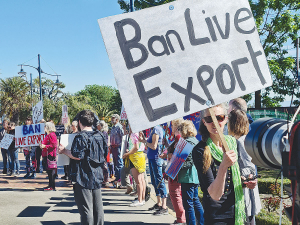Damien O’Connor: NZ united on global trade
When it comes to international trade, politicians from all sides of the aisle are united, says Labour's trade spokesman Damien O'Connor.
 Live exporters believe the Government was swayed more by protestors than industry in its move to soon ban the practice.
Live exporters believe the Government was swayed more by protestors than industry in its move to soon ban the practice.
Labour's 'Rural' MPs have towed the party line and backed Agriculture Minister Damien O'Connor's move to wind-up NZ's $280 million-a-year live export industry.
Both National and ACT rejected the plan to ban the export of live animals.
This follows a divided select committee report on whether the bill should be passed or not. O'Connor drew up the bill to ban live animal export by sea following the sinking of the Gulf Livestock 1 in 2020, which saw the deaths of 41 sailors and 6,000 cattle. It failed to win the full support of Parliament's Primary Production Select Committee.
"The Primary Production Committee has examined the Animal Welfare Amendment Bill," its report said. "The votes were tied, and we were unable to agree on whether the bill should be passed.
However, with the Government's support, it is expected the bill will pass through Parliament - where Labour has an outright majority.
National and ACT registered opposing views to their Labour colleagues over the bill, mainly related to its economic impact.
"It is the view of National Party committee members the projected economic loss caused by such a ban has been grossly underestimated, and that rural communities across New Zealand will be detrimentally affected by both job and revenue loss," they wrote in its dissenting view.
National suggested that the Ministry for Primary Industries (MPI) should instead "take a leadership role in setting and maintaining world-leading compliance standards".
ACT member Mark Cameron agreed, saying New Zealand should develop a "'gold standard' approach for our livestock export industry".
Labour members conceded that there were economic impacts of the legislation, saying the committee was advised "livestock export contributes $261 million to New Zealand's economy annually".
They were also not swayed by the views of submitter who warned the ban could lead to an increase in the annual slaughter of 1.8 million bobby calves, which could be sent overseas.
"The slaughter of bobby calves is wasteful compared to their use as breeding stock overseas," the report says. "Submitters said that the ban could potentially add around 130,000 more."
There were also differing views on whether banning live exports would improve New Zealand's reputation.
In fact, some submitters argued that a ban could be reputationally damaging to NZ.
"Banning livestock export would undermine New Zealand's reputation as a well-managed agricultural economy and transparent trading partner," the report said.
The bill will now go back to Parliament where it is expected to be passed, then the ban would be put in place in April next year.
Coming in at a year-end total at 3088 units, a rise of around 10% over the 2806 total for 2024, the signs are that the New Zealand farm machinery industry is turning the corner after a difficult couple of years.
New Zealand's animal health industry has a new tool addressing a long-standing sustainability issue.
The Government has announced that ACC will be a sponsor of this year's FMG Young Farmer of the Year competition.
As veterinary student numbers grow to help address New Zealand's national workforce shortge, Massey University's School of Veterinary Science is inviting more veterinary practices to partner in training the next generation of vets.
South Island dairy farmers will soon be able to supply organic milk to Fonterra.
Norwood has announced the opening of a new Tasman dealership at Richmond near Nelson next month.